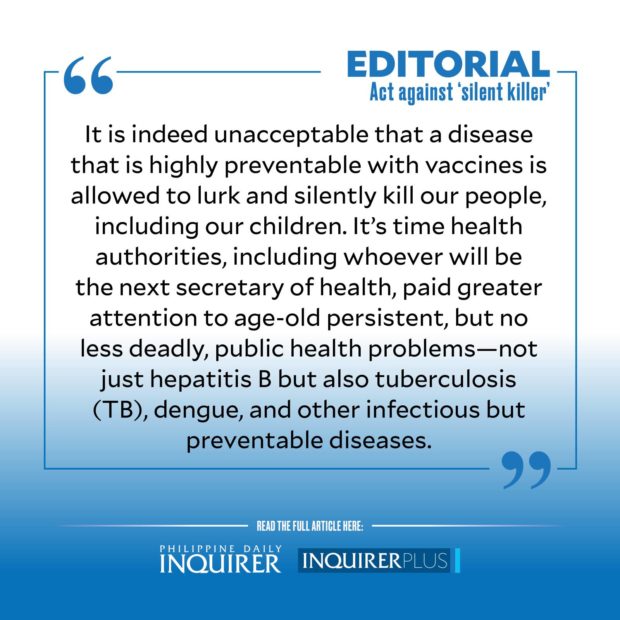One in every seven Filipinos is afflicted with hepatitis B, the most common liver infection in the country, with 67 percent of those with the disease developing liver cancer, a specialist said in a recent online forum.
In the Philippines, hepatitis B is considered “hyperendemic,” meaning most anyone not vaccinated against it is susceptible to the disease, said a recent news report.
This is alarming news, according to Dr. Wendell Espinosa, vice president of the Hepatology Society of the Philippines, since hepatitis B is known as a “silent killer,” with symptoms usually not detectable until the disease has reached an advanced stage.
Gundo Weiler, a former official of the World Health Organization (WHO) Philippines, said in an article that hepatitis B “quietly damages the liver for decades before ending in liver cancer and cirrhosis (scarring of the liver that reduces its ability to detoxify blood).”
It is a viral infection that attacks the liver, causing it to be inflamed and damaged. About 90 percent of infected children globally develop the chronic disease, while the WHO estimates that around 8.5 million Filipinos are chronically infected with the virus.
According to the US Centers for Disease Control and Prevention (CDC), the symptoms of the disease include fatigue, poor appetite, stomach pain, nausea, and jaundice. For majority of the infected, hepatitis B is a short-term illness. But for others, it can be a long-term, chronic infection that can lead to serious, even life-threatening health issues.
More than 500 Filipinos died of viral hepatitis from January to August last year, says the Philippine Statistics Authority. Worldwide, deaths due to the disease have been increasing over the past two decades, with 1.4 million lives lost every year.
Weiler pointed out that without intervention, the two most common types of hepatitis—B and C—cause about 60 percent of liver cancer, which is why liver cancer is one of the top causes of cancer deaths in the Philippines.
But more than the rising number of lives lost, what makes the prevalence and persistence of hepatitis B truly tragic is that it is an entirely preventable and, if identified early enough, curable disease.
The CDC says that hepatitis B is caused by a virus that is spread “when blood, semen, or other body fluids from a person infected with the virus enters the body of someone who is not infected.” One of the means of transmission is from mother to infant at birth, which explains why, even if most infected adults eventually recover, “about 90 percent of infants with hepatitis B go on to develop chronic infection.”
This is why experts highly recommend that newborns be given the first dose of the vaccine against the virus within 24 hours of birth, to be followed with two further doses. Medicines are available to stop the disease from progressing and developing into liver cancer.
But lack of public awareness, especially of the symptoms of the disease and the means of infection, is a big problem that the government needs to address.
“Hepatitis is a huge public health concern in the Philippines, but due to lack of awareness, many of those who have this viral disease may not even know they have it until it’s too late,” Weiler said.
Espinosa also pointed out the need to advocate testing for the disease. He pushed for the reduction of testing costs and the expansion of testing sites. The websites of different government hospitals show that testing rates range from P250 to almost P1,000, clearly discouraging many poor families from getting tested.
More importantly, the Department of Health (DOH) needs to address the lack of hepatitis B vaccination, which has been declining since 2017, covering only about 50 to 70 percent of the population in 2020.
Espinosa asserted that hepatitis B is so common in the country “because we haven’t maximized vaccination (against it).”
Before the emergence of COVID-19, the DOH rolled out in 2018 a nationwide testing program for hepatitis B. The project had aimed at testing around 3,000 children aged five or six years from around the country. It’s not too farfetched to suppose that this effort, to have been funded by both local and international resources, may have been sidelined by the urgency of the COVID-19 crisis.
But the country has since bounced back, if not yet fully, from the toll of the pandemic. Certainly, a renewed and more vigorous public information campaign is necessary to alert parents to the threat of hepatitis B especially among newborns, and to push more aggressively, together with local government officials, for testing and immunization.
It is indeed unacceptable that a disease that is highly preventable with vaccines is allowed to lurk and silently kill our people, including our children. It’s time health authorities, including whoever will be the next secretary of health, paid greater attention to age-old persistent, but no less deadly, public health problems—not just hepatitis B but also tuberculosis (TB), dengue, and other infectious but preventable diseases.
